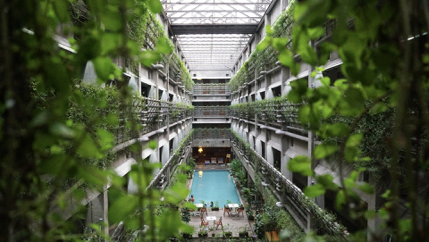Interior designers are racing to find ingenious ways to blend architecture, the environment, energy efficiency, and the benefits to the human psyche in structural designs. While classic architecture and interior design still hold their own, contemporary and futuristic design is fast becoming trendy. That’s because this new concept of architecture brings such an aim closer to being realized. And let’s face it: a building that looks futuristic looks really cool!
It’s not just homes that are leaning towards contemporary design. Hospitality establishments such as hotels, resorts, inns, and rental homes are also joining the Green Movement when it comes to architecture, construction, and design.
Updating to an Environmentally Friendly Futuristic Hotel
If you own a hospitality establishment and you want to update it, you might want to veer off the beaten path and look towards a futuristic design. The design alone not only gives you stunning structural and environmental advantages, but it will also make your establishment stand out from its competitors.
Check out these few tips to have an awesome hotel that looks as if it jumped out of a science fiction movie.
Use sustainable furniture, accessories, and fixtures
According to new recycling statistics, we are producing 2 billion tons of waste material each year. That’s a lot. But the thing is, a lot of these waste materials are totally recyclable, although we’re presently recycling just a fraction of it. So why not purchase recycled furniture, accessories, and fixtures in your new futuristic hotel?
We’re not just talking about saving items that are ready to be thrown away although you can certainly purchase second-hand ones. Many companies actually have developed technologies, systems, and processes to literally turn trash into useful things, including furniture. A lot of DIY enthusiasts and environmental organizations also create useful things out of stuff that is destined for the landfill. Check out your area or browse the web for these entities such as heavy-duty outdoor trash receptacles. Not only you’ll be saving the environment, but you’ll also support the local economy.
Shift to eco-friendly beds
The mattress is the heart of each room of your hospitality establishment. Sooner or later, you will need to change it, whether for an upgrade or replacement. Pick the best mattress that is made with environmentally friendly materials and processes.
In general, those made of natural latex foam are the standard of eco-friendly beds, but there are alternatives. Also look for bed cover materials such as wool, bamboo, or organic cotton. These materials are all environmentally friendly, sustainable, and renewable.
You should also opt for beds with certifications such as CertiPUR-US or Global Organic Textile Standard (GOTS). This means that the materials they’re using and their manufacturing process do not involve heavy metals, formaldehyde, phthalates, ozone depleters, and other toxic substances or pollutants.
Use CFL or LED bulbs
Hotels often use a lot of lighting for safety, mood, ambiance, comfort, and convenience. But with so many lights and due to a hotel’s long operating hours, the energy costs add up.
Diminish your establishment’s energy consumption by changing your bulbs to light-emitting diodes (LED). LED bulbs are tough, long-lasting, and come in many varieties. In addition, with new lighting technology embedded in them, they reduce maintenance and its resulting costs. Going by what an innovative master’s degree in product and interior design teaches us, it is essential to learn how to adapt and really master the art of change, and introducing energy-efficient lighting allows you to start a positive change right in your own hotel.
Replace old appliances
Technology has advanced to the point that many appliances can now operate with vastly better functionality and performance at less power than their old counterparts. So when you upgrade into a futuristic hotel, don’t forget to upgrade your appliances as well.
Replace your energy guzzler freezers, refrigerators, TVs, and other appliances with their newer counterparts. While the initial cost is high, you will be surprised at your energy bill savings.
Install water-saving devices
Your hotel uses a lot of water for sprinkling the plants, washing the guest’s clothes, cooking meals, and many more. You might even use a commercial water softener, from a website like Hillwater.com, to ensure that your guests are getting the best water possible. Your guests also use water from your system to wash. At the end of the month, you’ll look forlornly at your water bills.
This doesn’t have to be. You can install water-saving features like infra-red auto-shutdown faucets. After the guest washes his hands, the faucet automatically shuts down. Other ideas include motion-sensor showers; when the guest leaves the shower, the water automatically stops flowing.
High-tech sensors will do the trick, but there are also other ways that you can incorporate into your daily operation. For example, you can change your plant watering schedule. Rather than watering them mid-morning, you can do so in the afternoon when the temperature is much cooler. Or rather than a fountain as your hotel’s reception centerpiece, why not a huge vase of flowers or a massive sculpture? You save both water and electricity.
Go solar
In full operation, your hotel uses a lot of energy from the local grid. But by installing solar panels, you can cover at least a part of your establishment’s energy requirement. Yes, we’re still quite a long way from creating a fully solar-powered hotel, but technologies in generating power from the sun are advancing rapidly.
Install a roof garden
Many apartment buildings in the city have resorted to a new trend—planting a garden on top of the rooftop. Rooftop gardens are incredibly popular right now, and they can easily be built as long as there’s easy access to the roof, which most commercial establishments have.
Planting a roof garden in your hotel insulates your establishment efficiently by absorbing heat. You have a cooler hotel, and your heating, ventilation, and air conditioning system (HVAC) system don’t have to work too hard. That’s energy savings for your establishment.
Because plants absorb carbon dioxide and other pollutants, your hotel garden helps keep your surroundings fresh and cool. They help reduce greenhouse gas emissions and air pollution. And of course, a well-designed rooftop garden just looks really cool.
Conclusion
Is a futuristic looking hotel still the stuff of science fiction? Not anymore! With so many revolutionary technologies and design mindsets nowadays, you can definitely transform your hotel into a true, eco-friendly, energy-efficient, and beautiful hotel of the future.
Lillian Connors is a Senior Content Developer at ACT-ENVIRO, with years of experience in developing content.
Throughout her career, she always looked for ways to contribute to the environment in recycling efforts, while providing valuable information with her written articles.
She’s deeply into green practices, cherishing the notion that sustainability not only makes us far less dependent on others regarding how we live and do business but also contributes to our planet being a better place to live on. When she is not trying to improve the things around her (and herself, for that matter), she likes to lose herself in a good book and sip on an occasional appletini.



Comments are closed.